The 570s decade ran from January 1, 570, to December 31, 579.
The 580s decade ran from January 1, 580, to December 31, 589.

Year 573 (DLXXIII) was a common year starting on Sunday of the Julian calendar. The denomination 573 for this year has been used since the early medieval period, when the Anno Domini calendar era became the prevalent method in Europe for naming years.
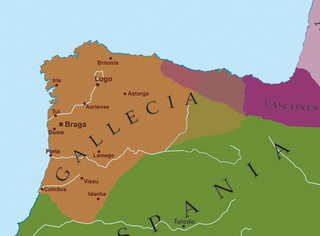
Year 585 (DLXXXV) was a common year starting on Monday of the Julian calendar. The denomination 585 for this year has been used since the early medieval period, when the Anno Domini calendar era became the prevalent method in Europe for naming years.

Gregory of Tours was a Gallo-Roman historian and Bishop of Tours during the Merovingian period and is known as the "father of French history". He was a prelate in the Merovingian kingdom, encompassing Gaul's historic region.

Chlothar II, sometimes called "the Young", was king of the Franks, ruling Neustria (584–629), Burgundy (613–629) and Austrasia (613–623).
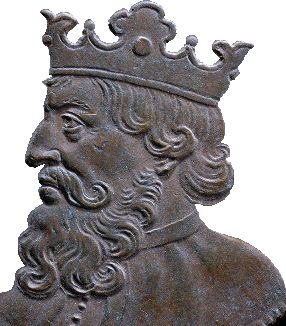
Chilperic I was the king of Neustria from 561 to his death. He was one of the sons of the Frankish king Clotaire I and Queen Aregund.

The Kingdom of the Franks, also known as the Frankish Kingdom, the Frankish Empire or Francia, was the largest post-Roman barbarian kingdom in Western Europe. It was ruled by the Frankish Merovingian and Carolingian dynasties during the Early Middle Ages. Francia was among the last surviving Germanic kingdoms from the Migration Period era.
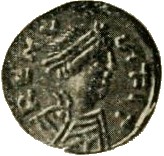
Sigebert I was a Frankish king of Austrasia from the death of his father in 561 to his own death. He was the third surviving son out of four of Clotaire I and Ingund. His reign found him mostly occupied with a successful civil war against his half-brother, Chilperic.
Fredegund or Fredegunda was the queen consort of Chilperic I, the Merovingian Frankish king of Neustria. Fredegund served as regent during the minority of her son Chlothar II from 584 until 597.
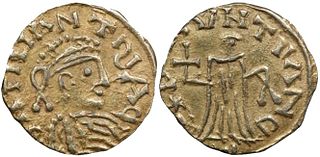
Saint Gontrand, also called Gontran, Gontram, Guntram, Gunthram, Gunthchramn, and Guntramnus, was the king of the Kingdom of Orléans from AD 561 to AD 592. He was the third-eldest and second-eldest-surviving son of Chlothar I and Ingunda. On his father's death in 561, he became king of a fourth of the Kingdom of the Franks, and made his capital at Orléans. The name "Gontrand" denotes "War Raven".
Brunhilda was queen consort of Austrasia, part of Francia, by marriage to the Merovingian king Sigebert I of Austrasia, and regent for her son, grandson and great-grandson.

Gundoald or Gundovald was a Merovingian usurper king in the area of southern Gaul in either 584 or 585. He claimed to be an illegitimate son of Chlothar I and, with the financial support of the Emperor Maurice, took some major cities in southern Gaul, such as Poitiers and Toulouse, which belonged to Guntram, king of Burgundy, a legitimate son of Chlothar I. Guntram marched against him, calling him nothing more than a miller's son and named him 'Ballomer'. Gundovald fled to Comminges and Guntram's army set down to besiege the citadel. The siege was successful, Gundovald's support drained away quickly and he was handed over by the besieged to be executed.
Basina, was a Frankish princess, the daughter and youngest child of Chilperic I, King of Soissons, and his first wife, Audovera. After surviving the assassination of her immediate family, she became a nun. She later helped to lead a rebellion by a group of the nuns, which became a scandal throughout the region. This event was chronicled by the bishop and saint, Gregory of Tours, who was one of the bishops chosen to settle the matter.

Saint Prætextatus, also spelled Praetextatus, Pretextat(us), and known as Saint Prix, was the bishop of Rouen from 549 until his assassination in 586. He appears as a prominent character in Gregory of Tours’ Historia Francorum. This is the principal source from which information on his life can be drawn. He features in many of its most notable passages, including those pertaining to his trial in Paris and his rivalry with the Merovingian Queen Fredegund. The events of his life, as portrayed by Gregory of Tours, have been important in the development of modern understandings of various facets of Merovingian society, such as law, the rivalry between kings and bishops, church councils, and the power of queens.
Zaban, also known as Zabanus, was the Lombard dux of Pavia (Ticinum) during the decade-long interregnum known as the Rule of the Dukes. Pavia had been the capital of the Lombardic kingdom, but after the death of King Cleph, it became the centre of a great duchy, one of thirty-five into which the Lombard state was then divided. It seems that, as the ruler of the ancient capital, Zaban held a certain superiority of rank over his fellow duces and may have acted as their commander-in-chief.
Maurontus was the Duke or Patrician of Provence in the early 8th century. He aspired to independence in the face of Charles Martel, Duke of the Franks, and the Provençal patrician Abbo.
Desiderius was a Gallo-Roman dux in the Kingdom of the Franks during the reigns of Chilperic I and Guntram. He served Chilperic as Duke of Aquitaine and was his greatest general.
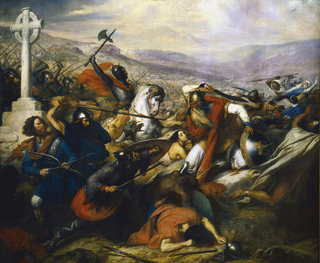
The Umayyad invasion of Gaul, also known as the Islamic invasion of Gaul, refers to a series of military campaigns by Muslim forces to expand their territory into the region of Gaul following the Umayyad conquest of the Iberian peninsula (711-718). The Umayyad invasion occurred in two phases, in 719 and 732 AD. Although the Umayyads secured control of Septimania, their incursions beyond this into the Loire and Rhône valleys failed. In 759, Muslim forces lost Septimania to the Christian Frankish Empire and retreated to the Iberian Peninsula which they called al-Andalus.

Gontran Boson, also known as Gontran The Cunning, was a Frankish duke in the service of the Merovingian kings Sigebert I and Childebert II. He was born around 545 and died in 587.










